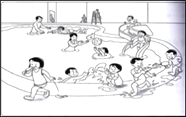题目内容
—I failed in the exam yesterday.
—________. It's not the end of the world. Work harder!
A.I am sorry B.That's Ok C.Come on D.Not at all
All of us want to be healthy. To keep healthy, more and more people are doing sports. Do you like sports? If yes, which is your favorite sport? Look at the ads(广告), they may help you.
Nancy’s Gym Lose weight! $25/ hour Opening time: Saturday and Sunday Tel: 455-6223 |
Ice World Have fun skating here! $ 20/ hour for children $ 30/ hour for adults(成年人) Tel: 886-8252 |
Water World Opening time: 9:00 a.m. ~9:00 p.m. every day Adults: $ 10 Children(aged 15 and under): $ 7 Tel: 215-1829 Come to Water World! Two pools for children Two large pools for adults Two restaurants |
1.What do people in Nancy’s Gym want to do?
A.To enjoy swimming. B.To learn to skate.
C.To lose weight. D.To eat delicious food.
2.If Mr. Smith goes skating with his child, they need to pay ________ for two hours’ skating.
A.$ 50 B.$ 60
C.$ 80 D.$ 100
3.People can go to Water World at ________.
A.8:00 a.m. B.1:30 p.m.
C.9:30 p.m. D.10:00 p.m.
4.You can call ________ if you want to swim.
A.215-1829 B.886-8252
C.215-1982 D.455-6223
5.Which of the following is TRUE?
A.Ice World is only for adults. B.People can go to Nancy’s Gym on Sunday.
C.There are four large pools in Water World. D.Children needn’t pay to go swimming in water World.




